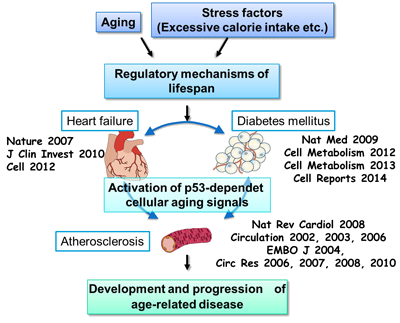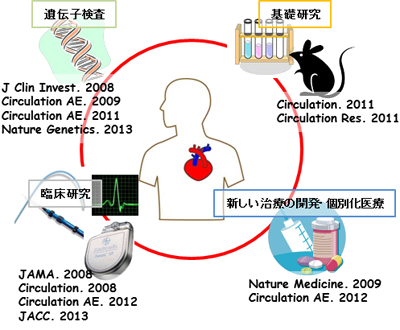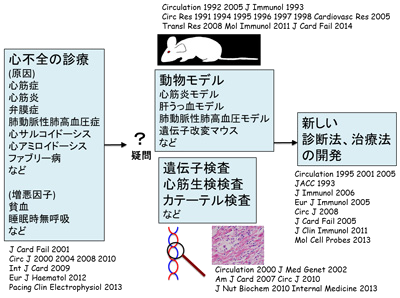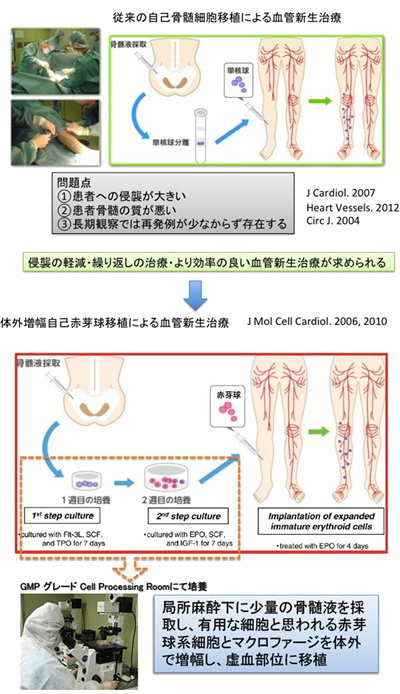Cardiovascular Biology and Medicine
HOME > Activities > Clinical Medicine > Cardiovascular Biology and Medicine
1.Research Summary
The Department of Cardiovascular Medicine conducts basic and clinical research on arrhythmias, heart failure, and ischemic heart disease, as well as basic and clinical research aimed at the control of aging. In the areas of regenerative medicine and arrhythmias, we also promote translational research, in which basic data are applied to the clinical setting.
2.Research Groups
- Aging Control Group
- Arrhythmia Group
- Heart Failure Group
- Ischemia and Regeneration Group
3-1.Aging Control Group
Research Subjects
- Mechanisms of cardiovascular and metabolic aging
- Development of new therapies for lifestyle-related diseases in terms of aging
- Mechanism of individual longevity regulation
- Establishment of aging and longevity mouse models, and human longevity
3-2.Arrhythmia Group
Research Subjects
- Genetic background involved in the onset of arrhythmias.
- Personalized medicine for arrhythmias based on gene information.
- Identification of new risk factors for arrhythmias and establishment of risk stratification.
- Investigation of the underlying mechanism of J-wave, T-wave, and their contribution to arrhythmia.
- Development of the novel method of catheter ablation for ventricular fibrillation targeting the anatomical factors associated with the occurrence and maintenance of ventricular fibrillation.
- Investigation of the mechanism of initiation and maintenance of arrhythmias with optical mapping system.
- Multisite pacing for patients with severe heart failure.
- Establishment of the comprehensive clinical management of the patients with totally subcutaneous implantable cardioverter defibrillators (S-ICD) and conventional ICDs.
- Evaluation of the influence of physiological anti-coagulant factor, inflammation, and aging on the various anti-coagulation therapies.
- Prospective multicenter study evaluating the efficacy of atrial fibrillation ablation in the secondary prevention of cardiogenic cerebral/systemic embolism.
- Multicenter randomized controlled study evaluating the efficacy of sodium glucose cotransporter (SGLT) 2 inhibitor in the secondary prevention of ventricular tachyarrhythmia in the patients with implantable cardiac defibrillators (ICD).
3-3.Heart Failure Group
Research Subjects
- Animal studies on the etiologies, mechanisms, and treatments of heart failure
- Association of heart failure with immunity and inflammation
- Genetic analysis of heart failure disease
- Heart failure and iron metabolism
- Mechanism of pulsus alternans
- Basic and clinical research aimed at improving the prognosis of heart failure
3-4.Ischemia and Regeneration Group
Research Subjects
- Ex-vivo expanded erythroblast transplantation (autologous)
- Evaluation of the prospective observation of epoetin beta-administration for the treatment of myocardial infarction-II (EPO/AMI-II)
- Basic and clinical research aimed at improving the prognosis of ischemic heart disease
- Development of biomarkers to evaluate the severity of ischemic heart disease
Website of the Department of Cardiovascular Medicine
4.Research Results
|
[Area] Cardiovascular medicine (control of aging) |
|
|
[Research subject] Mechanisms of cardiovascular and metabolic aging |
|
|
[Description] |
[Photographs]
|
|
lifetimes of cells obtained from patients with progeria syndrome indicate that the activation of cellular aging signals in tissues that occurs with aging may be involved in longevity and the pathophysiology of aging-related diseases. We have actually revealed that such cellular aging signals are activated in tissues (e.g., blood vessels, heart, and lipids) by aging and stress factors such as overeating, form an interactive network, and thereby become involved in the pathology of aging-related diseases. We will step up to the challenge of developing new therapies targeting these signals in the future. |
|
|
[Area] Cardiovascular medicine (arrhythmias) |
|
|
[Research subject] Backgrounds and mechanisms of arrhythmias, and establishment of personalized medicine |
|
|
[Description] |
[Photographs]
|
|
In addition, we recently developed a new genetic screening assay based
on a next-generation sequencing method. J and T wave have been reported
to be associated with the occurrence of life-threatening ventricular arrhythmia.
We have investigated and reported the mechanisms of J, T wave and their
contribution to the occurrence and maintenance of arrhythmia using the
unique mapping system which can record the transmural electrocardiogram
from whole hearts. Ventricular fibrillation (VF) is the worst form of arrhythmia.
However, we have few methods for prevention of VF thus far. We conduct
the joint research with laboratories in the USA to develop the novel method
of catheter ablation for VF targeting the anatomical factors associated
with the induction and maintenance of VF. In the patients with atrial fibrillation
(AF), prevention of cardiogenic cerebral/systemic embolism is an important
clinical issue. Patients at adequate risk of cardiogenic cerebral/systemic
embolism are on anti-coagulation therapies with warfarin or direct oral
anticoagulants (DOAC). We evaluate the influence of physiological anti-coagulant
factor, inflammation, and aging on these anti-coagulation therapies. Moreover,
we are conducting a prospective multicenter study evaluating the efficacy
of AF ablation in the secondary prevention of cardiogenic cerebral/systemic
embolism. In basic research, we are planning to implement the optical mapping
system with the cutting edge high speed cameras and image processors to
image the activation pattern in atrium of (gene-modified) mice. The system
will enable us to investigate the mechanism of initiation/maintenance of
arrhythmias and correlation between its onset and aging/life style. Furthermore,
we are now planning to conduct a multicenter randomized controlled study
evaluating the efficacy of sodium glucose cotransporter (SGLT-2) inhibitor
in the secondary prevention of ventricular tachyarrhythmia in the patients
with implantable defibrillators. |
|
|
[Area] Cardiovascular medicine (heart failure) |
|
|
[Research subject] Etiologies of and factors precipitating heart failure |
|
|
[Description] |
[Photographs]
|
|
We conduct research to answer various questions that arise in clinical practice for heart failure through analyses and genetic diagnosis using animal models. As for the association of heart failure with immunity and inflammation, particularly, we have reported various findings. There has recently been an increasing recognition of the relevance of the association of heart failure with inflammation. It is considered likely that T cells, dendritic cells, macrophages, and cytokines, for instance, that are directly involved in inflammation, are not only engaged in injuries to the heart itself but also exert various effects on the whole body, being significantly involved in the etiologies of and the factors precipitating heart failure. Meanwhile, cases of cardiomyopathy due to genetic abnormalities have been successively revealed in recent years. We also aggressively perform genetic analyses to contribute to the elucidation of these disease entities and conduct research to achieve radical treatment in accordance with the etiologies of heart failure at our department. In addition, we hope to clarify various factors, including anemia and sleep apnea, which are involved in the exacerbation of heart failure and to study heart failure from a systemic standpoint in order to develop beneficial new therapies to be applied in clinical practice. |
|
|
[Area] Cardiovascular medicine (ischemia and regeneration) |
|
|
[Research subject] Ex-vivo expanded erythroblast transplantation (autologous) (EVEETA study) |
|
|
[Description] |
[Photographs]
|
|
factors, including EPO. An investigation using a mouse lower limb ischemia
model demonstrated that the angiogenic effect of this culture method was
10 times as potent as the therapeutic effect of the conventional method,
BMI. |
|




